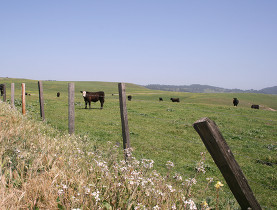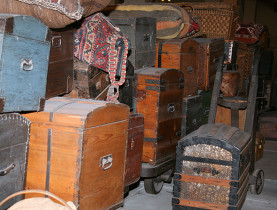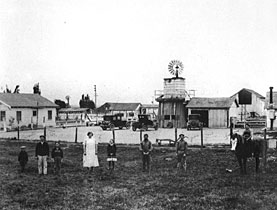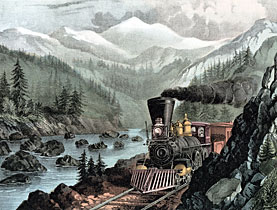Swiss roots still sunk deep in California soil

The descendants of Swiss ranching pioneers in California's Bay Area are helping spearhead the state's sustainable agriculture movement.
The growing popularity of organic and locally produced food is most evident at the Marin Farmers Market in San Rafael, just north of San Francisco.
Around 10,000 people buy their produce, cheese and bread here each Sunday – that’s three times more market goers than only a few years ago.
A large part of the attraction is San Rafael’s proximity to some of the suppliers – the ranches dotting Marin’s rolling hills to the north of the town which, at least from the roadside, look much as they must have done 100 or more years ago.
Many Swiss-Italians settled here in the second half of the 19th century, operating dairy ranches that became major producers of the butter and cheese delivered to San Francisco’s burgeoning population.
According to an 1890 census, the Swiss were second in number only to the Irish among the county’s immigrant population. And the descendants of the Swiss-Italians today not only control well over a third of Marin’s remaining farmland, but have also been instrumental in preserving it.
Urban sprawl pressures coupled with the desire to maintain their farming heritage, led local ranchers to help found the Marin Agricultural Land Trust (MALT) in 1980.
One of them was Ralph Grossi, whose grandfather Domenico arrived in 1892 and was able to save enough money to purchase in 1917 the ranch that Ralph and his siblings now live on.
Deep roots
“I and others had a very strong belief that if we protected the land then other factors would come into play,” Ralph explains, describing these factors as the “deep roots” Swiss families have in the area, and the “wonderful potential” to sell what is grown to the large and affluent population of the Bay Area.
In order to protect farmland from subdivision or non-agricultural development, MALT purchases so-called “agricultural conservation easements” on land using funds donated by individuals, public money and foundation grants. The property remains privately owned. The easement sale proceeds are used by the family to continue working the land or to buy out co-owners who wish to sell.
The non-profit organisation claims it has preserved 40,500 acres (more than 160 square kilometres) in this way, which is more than a third of all farmland in the county.
Since environmentalists were also involved in the creation of MALT, sustainable agriculture is more than a buzzword in the region and is exemplified by the ranch of Sally and Mike Gale.
In the mid-Nineties, the couple left good jobs and a comfortable lifestyle in Hawaii to take over the ranch bought in 1862 by Sally’s great-grandfather (surname Martinoia), an immigrant from the town of Cevio in Ticino’s Maggia valley.
Cow poop
“The only fertiliser we use is cow poop,” Sally says in her straight-talking manner. When they arrived on the ranch, the couple rebuilt the dilapidated Italianate-style house.
They introduced a herd of beef cattle raised naturally on grass. Mike, a member of the MALT board, is responsible for the cattle while Sally looks after the organic apple orchard, vegetable garden, sheep and chickens, as well as organises art workshops and weddings on the farm.
They have also restored the creek that runs through the property by planting native plants and trees along its banks. To prevent run off from the “cow poop”, they put up fences to keep the cattle well away from the watercourse.
Sally has seen dairy farms struggle and go out of business but those that have persevered have gone into niche markets, making cheese and other products.
State of flux
“We’re certainly in a state of flux,” she says. “A number of our neighbours have switched to grass-fed [beef] and organic is certainly growing.”
Back on the Grossi ranch, Ralph drives to the top of a pasture to show the extent of the property. Hidden behind a hill about three miles away, he says, is a suburb. It is on the northern edge of the urban sprawl MALT and its supporters have been trying to stop.
He says environmental groups want to see the ranches remain because of their owners’ high-degree of environmental awareness in an area considered sensitive due to the proximity of San Francisco and Tomales bays, two major estuaries.
But ranchers like Ralph have other reasons to stay.
“My grandfather made all of his children promise they would never take out a mortgage on their land,” Ralph says.
“He paid cash for all of the ranches he bought in Marin and Sonoma counties. One of the core values that has been installed in all of us is that the land is our heritage. It’s what our grandparents and parents worked for – and you don’t risk that land.”
Dale Bechtel in Marin County, California, swissinfo.ch
From the 1860s until the 1890s, Marin County dairies were the major supplier of butter and cheese to San Francisco. The butter produced on the dairies around Point Reyes in Marin was considered to be of the highest quality in the state.
According to an 1890 census in Marin, 165 residents were born in Switzerland, second only to 320 Irish.
But, according to local historians, it was the Swiss along with Portuguese immigrants who went into dairy farming.
The Swiss were well established in northern California by the end of the 19th century. An 1888 newspaper clipping archived at the Marin History Museum speaks of “A Gala Day”, when more than 1,000 people travelled to the town of Tomales to take part in “the Swiss celebration”.
Dignitaries came by train from as far away as San Francisco to make and listen to speeches. A procession of marching bands, “carriages, buggies and family wagons stretched out for over a mile and presented a gay appearance”.
Source: Marin History Museum
MALT was founded in 1980 by a coalition of ranchers and environmentalists to preserve farmland in Marin County.
It acquires agricultural conservation easements on farmland in voluntary transactions with landowners.
To date, MALT has permanently protected more than 160 square kilometres of land on 63 family farms and ranches.

In compliance with the JTI standards
More: SWI swissinfo.ch certified by the Journalism Trust Initiative













You can find an overview of ongoing debates with our journalists here . Please join us!
If you want to start a conversation about a topic raised in this article or want to report factual errors, email us at english@swissinfo.ch.